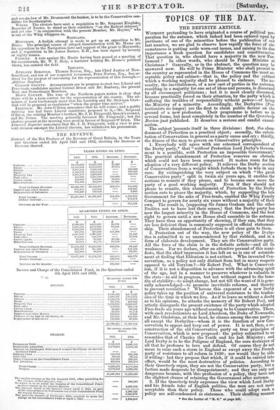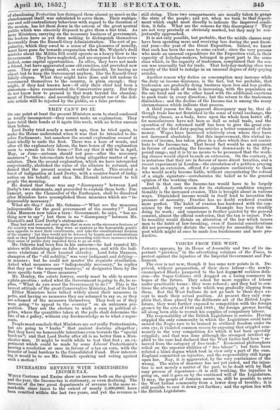TOPICS OF THE DAY.
THE DEFINITE ARTICLE.
Wrriforr pretending to have originated a course of political pre. paration for the autumn, which indeed had been entered upon by partisans of one of the minorities before the publication of our last number, we are glad to observe how rapidly the force of cir- cumstances is putting aside worn-out issues, and raising to its due importance a fresh question for candidates and constituencies. That question is who should have a majority in the new Par- liament ? In oilier words, who should be Prime Minister at Christmas ? Generally, or in the abstract, the question may be answered now. He will be Prime Minister who shall present to the country as represented in the House of Commons the most ac- ceptable policy and cabinet-that is, the policy and the cabinet which a working majority shall be pleased to embrace. The ne- cessity, the inevitableness, of a new east of parties in the autumn, resulting in a majority for one set of ideas and persons, is discerned by all circumspect politicians • but it is most clearly discerned, because practically forced on their attention, by the party which is suffering the troubles of responsibility 'without power-of being the Ministry of a minority. Accordingly, the Derbyites (Pre. tectionists no longer) are the first to claim public favour on the ground of a new profession. Their programme is before us in several forms, but most completely in the number of the Quarterly _Review just published. It deserves a serious and candid exami- nation.
The subject ;presents itself in three divisions : first, the aban- donment of Protection as a practical object; secondly, the substi- tution of Conservatism in general as a party cause and cry ; thirdly, the fitness of the men to govern on Conservative principles. 1. Everybody will agree with our esteemed correspondent of
the Derby party,* that " without Protection Lord Derby's Govern- ment is a possible, with Protection an impossible Government." The practical abandonment of Protection removes an obstacle which could not have been conquered. It makes room for the adoption of a very different policy. It relieves the Derby section of Conservatives from a weight which forbade them to win in any race. By extinguishing the very. subject on which "the great Conservative party" split in twain six years ago, it enables the sections to reunite if they please, and to become once more the party of a good working majority. Even if they should not please to reunite, this abandonment of Protection by the Derby section cuts to pieces the majority, which, by supporting the late Government for the sake of Free-trade, enabled the Whig Family Compact to govern for nearly. six years without a majority of their own. The result is, (supposing Sir James Graham and the other Peelites not to have lost their senses,) that the Derby party has now the largest minority in the House of Commons, and the best right to govern until a new House shall assemble in the autumn. They have thus an opportunity of showing, if they can, that they are less deficient than is commonly supposed in official statesman- ship. Their abandonment of Protection is all clear gain to them.
2. Protection out of the way, the new policy of the Derby- ites is submitted to us unencumbered by that rubbish, and in a form of elaborate development. They are the Conservative party. All the force of the claim is in the definite article-and all its weakness. For we declare, after an attentive perusal of this mani- festo, that the chief impression it has left on us is one of astonish- ment at finding that Eldonism is not extinct. Who invented Con- servatism, as a policy not only distinct from but in many respects opposed to old Toryism P-Sir Robert Peel. What is Conservat- ism, if it is not a disposition to advance with the advancing spirit of the age, but in a manner to preserve whatever is valuable in the state-to aid in progress, but not without regard to the bene- fits of stability-to adopt change, but not till the want of it is gene- rally acknowledged-to promote inevitable reforms, and thereby to prevent revolution ? Whereas this exponent of a new Derby policy takes up the position of universal resistance to the tenden- cies of the time in which we live. As if to leave us without a doubt as to his opinions, he attacks the memory of Sir Robert Peel, and utterly disregards the present existence of the party which adopted Free-trade six years ago without ceasing to be Conservative. These, with such revolutionists as Lord Aberdeen, the Duke of Newcastle, and Mr. Gladstone, at their head, he classes among the one party- all except the Derbyites-whom it is the function of new Con- servatism to oppose and keep out of power. It is not, then, a re- construction of the old Conservative party on true principles of Conservatism, which is now proposed : the policy submitted to na resembles that of Charles the Tenth and his last Ministry; and Lord Derby is to be the Polignac of England, the sure destroyer of all that he professes to love and defend. Of course they do not mean to raise such a storm in England as swept away the French party of resistance to all reform in 1830; nor would they be able if willing : but they propose that which, if it could be carried into effect, would be the most destructive of policies. According to their Quarterly organ, they are not the Conservative party, but a faction made desperate by disappointment; and they are only not dangerous because, with this profession of a policy, they have not the slightest chance of retaining the Government after autumn. 3. If the Quarterly truly expresses the view which Lord Derby and his friends take of English polities, the men are not more acceptable than their policy. Those who could adopt such a policy are self-condemned as statesmen. Their shuffling manner
• See the Letter of "R. 8." at page 343. of abandoning Protection has damaged them almost as much as the abandonment itself was calculated to serve them. Their ambigu- ous and self-contradictory behaviour with regard to the duration of the session, has let them down in the esteem of the great neutral public which was sincerely disposed to give them a fair triaL As mere Ministers, carrying on the necessary business of government, the leaders have as yet done nothing to distinguish themselves favourably from the Russell-Grey Administration. The sort of po- pahuity, which they owed to a sense of the pleasures of novelty, must have gone far towards evaporation when Mr. Walpole's droll mistake about the Militia Bill could operate as a heavy blow to the Government. They have neglected, and are supposed to have over- looked, some capital opportunities. In office, they have not made a friend, but have aggravated some old enmities, and provoked new ones. They are getting credit, or rather discredit, for having no object but to keep the Government anyhow, like the Russell-Grey family cliques. What they might have done and left undone to recommend themselves to the country, is plain enough : they might, if they had known how—if only their chief had been a statesman—have reconstructed the Conservative party. But they do not know how to proceed in that work beyond the abandon- ment of Protection; and accordingly their present use of the defi- nite article will be rejected by the public, as a false pretence.



























 Previous page
Previous page